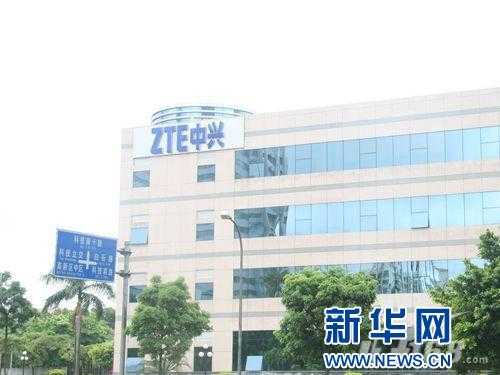The ZTE ban: a hasty gamble
- By Hassan Arshad Chattha
 0 Comment(s)
0 Comment(s) Print
Print E-mail China.org.cn, April 20, 2018
E-mail China.org.cn, April 20, 2018

ZTE [Photo/Xinhua]
Ongoing simmering trade tensions assumed entirely new and troubling dimensions as the U.S. Commerce Department hit ZTE, China's second-largest and the world's fourth-largest telecommunications equipment manufacturer, with a seven-year ban from being able to purchase parts and software from U.S. businesses. The company has clients all over the world, including major American carriers and businesses.
This marks the most serious escalation thus far by the U.S. in a trade dispute that is now spilling over into the broader geopolitical arena.
The ban could prove catastrophic for ZTE, as some critical components in its business require chips and software produced by U.S. companies. Furthermore, Google could also revoke ZTE's Android software license, rendering sales of its phones outside of China nearly impossible. The ramifications are wide-ranging in both the short and the long term.
One of the most significant takeaways from this action is that the U.S. has opened a new front in the trade dispute by attacking private enterprise. This has troubling implications. Companies which had ZTE as a client will also suffer from this. Chip manufacturing giant Qualcomm has business to the tune of hundreds of millions of dollars with ZTE. Acacia Communications Inc., which depended on ZTE for nearly a third of its revenue for 2017, saw its shares dive 35 percent on the news, causing it to suspend transactions for the time being. Other partners are also being adversely affected.
Last month, Huawei, another Chinese smartphone company, announced that it was unable to secure a deal to sell its flagship series in the U.S. through carriers, which is usually a death knell for a product in the American market. This is in addition to steps taken by the U.S. Congress to bar purchases of carrier-grade and enterprise networking equipment and technology products from ZTE and Huawei. Policymakers cited unproven fears pertaining to spying – which is quite ironic, considering the recent revelations of election meddling facilitated by U.S.- and U.K.-based tech companies.
Both ZTE and Huawei are at the forefront of research and development of next-generation communication and connectivity technologies and standards, referred to as "5G," and chances are that their development will now also be hampered. One very unpleasant outcome might be the emergence of multiple competing, incompatible standards, which will prove to be a veritable nightmare for consumers, carriers and phone manufacturers.
There is also a possibility that other companies may be targeted in this fashion, which will most definitely inspire a similar response from the other side.
The second takeaway from this measure is that the U.S. may have opened a Pandora's box by selectively demanding the enforcement of international rules based on its own geopolitical and economic interests. The U.S. Commerce Department stated that the measure was taken due to the prohibited sale of technology to Iran and North Korea, two countries sanctioned by the U.S. for reasons which include nuclear proliferation.
What is interesting in this regard is that the U.S. previously ignored considerably more serious guidelines regarding the Nuclear Non-Proliferation Treaty and signed a controversial bilateral nuclear agreement with India, despite serious and justified reservations expressed by the international community. At the time, the U.S. thought little of international rules and regulations as it tried to woo a potential partner in the region, ignoring the disruption it was causing in the power balance and already-fraught relations between the beneficiary country and its two nuclear-armed neighbors, Pakistan and China.
The ZTE ban again raises the existential question of arbitrary sanctions when the U.S. and its allies are reaping massive profits selling arms and weaponry to nations and outfits that are wreaking havoc on global peace and security, as well as responsible for multiple ongoing humans rights violations and catastrophes such as those in Syria, Yemen and Palestine. The UN is on record attesting to the criminality of these atrocities.
There is a worrying trend emerging as the scope and intensity of these events widens. This follows the imposition of tariffs on the import of solar panels manufactured in China. Considering that in the US, installation and maintenance costs are a more substantial portion of the cost of moving to solar, both environmentalists and notable companies involved in solar such as Elon Musk's SolarCity complained that this measure would only raise costs and slow down adoption. In the long term, this trend of broadening the scope of sanctions and bans imposed for geopolitical reasons will impact technological progress and global stability adversely. The stakes have never been higher, as humanity stands on the cusp of the most profound transformation since the onset of the industrial revolution, arising from momentous changes brought about by technologies such as big data, machine learning, AI, the "internet of things," the blockchain, and social media. Never has there been a worse time in history to initiate a convoluted and messy trade dispute.
It would be in the world's best interests if there was a conscious effort to not repeat the mistakes of the past stemming from paranoia and narrow mindedness. There are a wide variety of frameworks and mechanisms in place to deal with trade disputes, and all options should be exhausted rationally before resorting to issuing ultimatums that could have unpredictable and undesirable repercussions.
The author is a journalist and media strategist currently based in Beijing.
Opinion articles reflect the views of their authors, not necessarily those of China.org.cn.






Go to Forum >>0 Comment(s)